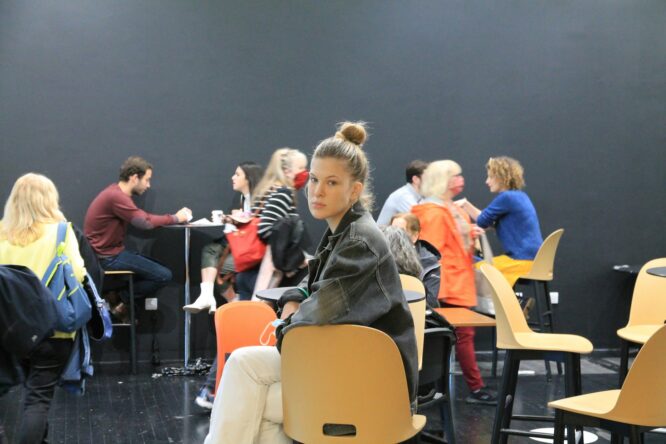Everyone has flaws, but some people are unapologetic about their less desirable qualities.

While you might insist you do your best to be a good person, your actions might be telling a completely different story than your words. Sure, it takes a bit of effort (and self-control!) to do the right thing all the time, but it’s work that truly good people are happy to put in for the sake of doing right by everyone around them. However, if you’re guilty of these bad behaviours, you might not be as great of a human being as you portray yourself, and it may be time to start making a few changes.
1. You lie your way out of awkward situations.

When you’re in an uncomfortable situation, a little white lie often seems like the easiest way out. But here’s the problem: lying, even the small stuff, can really mess with people’s trust. And once that’s gone, it’s hard to get back. Being upfront, even when it feels awkward, is way better than trying to cover things up. It’s all about building authentic relationships – and that starts with being honest, no matter how hard it might be.
2. You secretly enjoy putting people down.

Do you get a kick out of making people feel small, even if it’s just through a sarcastic comment or a little joke at their expense? If so, that’s a pretty big red flag. True kindness doesn’t come from putting people down to make yourself feel better. It’s about encouraging people and helping them feel good about themselves. So if you catch yourself tearing someone down, take a moment to think about how you can change that and start showing more support instead.
3. You refuse to apologise, even when you’re wrong.

Admitting you’ve messed up isn’t easy. It’s tough, and no one likes being wrong, but refusing to apologise, even when you know you’ve hurt someone, is a sign of immaturity – or worse, arrogance. Apologising doesn’t make you weak; it shows that you care about the other person’s feelings. If you struggle with this, maybe it’s time to take a step back and think about how much you actually value the relationships in your life. Apologising when necessary is a sign of emotional maturity and a healthy relationship.
4. You have no problem cutting people off mid-sentence.

Interrupting people all the time is a sign that you don’t really value what they have to say. Everyone deserves the chance to speak without being interrupted, and by cutting people off, you’re basically telling them their words don’t matter. Showing respect for someone’s thoughts means giving them the space to finish what they’re saying. If you find yourself cutting people off a lot, try practising patience and active listening – it’s a much more respectful way to communicate.
5. You tend to manipulate situations to your advantage.

Manipulating people or situations to get what you want is a huge red flag. Healthy relationships thrive on fairness and respect, not manipulation. If you’re always trying to tilt things in your favour, you’re not treating people like equals. Instead of looking for ways to win at other people’s expense, try focusing on mutual respect and teamwork. You’ll find that healthy, balanced relationships bring way more satisfaction in the long run.
6. You always make excuses for bad behaviour.

Making excuses for poor behaviour doesn’t do anyone any favours. If you snap at someone or make a mistake, it’s easy to justify it with some reason – “I was having a bad day,” or “I didn’t mean it.” But that’s just avoiding accountability. Instead of rationalising your behaviour, own up to it. Acknowledge where you went wrong, learn from it, and make an effort to do better next time. Being accountable for your actions shows maturity and responsibility.
7. You don’t care about other people’s boundaries — you do what you want.

Boundaries are there to protect people’s emotional, physical, and personal space. When you ignore them, it’s not just disrespectful – it’s harmful. Everyone has their own comfort zones, and repeatedly overstepping those lines shows a lack of consideration. Respecting boundaries is a key part of any healthy relationship. If you’re not great at respecting other people’s boundaries, take a moment to think about how you can be more mindful of their needs and limits.
8. You’re selfish with your time and resources.

Being selfish with your time and energy can isolate you from the people around you. Yes, it’s important to prioritise your own needs sometimes, but building strong relationships is about balance. Generosity with what you have shows that you care about those around you and are willing to support them when they need it. Being overly focused on yourself can make you seem unapproachable and prevent meaningful connections from forming. Sharing the load is what makes relationships thrive.
9. You talk about people behind their backs, even your friends.

Gossiping about people – especially when they’re not around to defend themselves – is a major sign of insecurity. If you spend more time talking about other people than addressing issues directly with them, it might be time to rethink your approach to communication. Healthy conversations are all about solving problems, not spreading rumours or tearing people down. Gossip only leads to mistrust and makes you look like you’re just stirring the pot. Focus on healthy, direct conversations, and you’ll build more trust with people (and look less like a troublemaker).
10. You’re not very empathetic to other people’s struggles.

It can be hard to empathise when you haven’t experienced someone else’s pain or problems, but being unable or unwilling to put yourself in someone else’s shoes is extremely limiting. Everyone goes through tough times, and showing that you care about what people are going through is key to connecting on a deeper level. If you find it difficult to empathise, try putting yourself in their place more often. You don’t need to fix their problems – it’s all about showing that you understand and care.
11. You regularly take credit for other people’s work.

Taking credit for something you didn’t do is a guaranteed way to damage your integrity. Whether it’s at work or in a personal project, true leaders and team players give credit where it’s due. If you’re always taking the spotlight, even when it’s not yours to take, you’re not showing humility. In fact, you’re being pretty gross. Celebrate the success of those around you, and you’ll find that people respect you a lot more.
12. You hold grudges for too long.

Refusing to forgive and forget might feel like you’re protecting yourself, but in reality, it just keeps negativity alive in your relationships. It’s natural to feel hurt when someone wrongs you, but holding onto that pain for too long only hurts you in the end. Learning to forgive – and actually letting go – is key to moving forward in a more positive direction. If you’re struggling to forgive, it’s worth considering how much that grudge is costing you in terms of your own peace of mind.
13. You can always find something to criticise about people.

Constantly picking apart other people’s flaws says more about your own insecurities than it does about them. Constructive criticism is fine, but if you’re always finding something to complain about, it’s time to ask yourself why. Criticism should help people grow, not tear them down. If you’re overly critical, consider how you can be more compassionate and encouraging – it’ll go a long way in strengthening your relationships.
14. You never take responsibility for your actions.

Blaming everyone else for your mistakes or refusing to own up to your actions is a massive red flag. Taking responsibility shows emotional maturity, and it’s necessary for building trust with the people around you. No one expects you to be perfect, but owning your actions and learning from them is what makes you a better person in the long run.
15. You only show up when it benefits you.

If you’re only around for people when there’s something in it for you, that’s not how real relationships work. Genuine connections require mutual support and effort from both sides. If you’re always showing up only when it’s convenient or beneficial, it’s time to think about what you’re bringing to the table. True friendships and relationships are about being there for each other, no strings attached.




